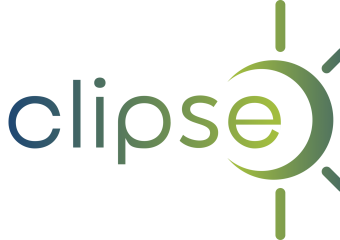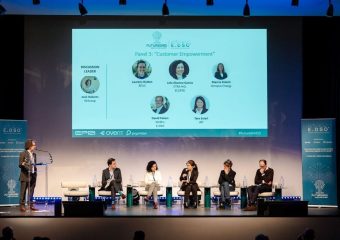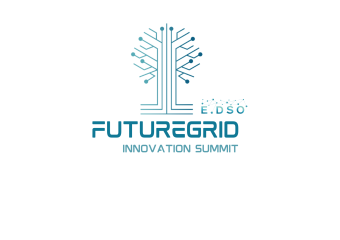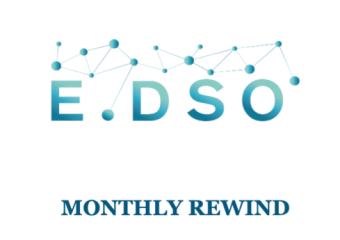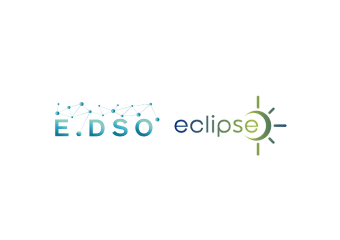E.DSO hosts webinar on the evolving role of customers in the energy system
9 July 2020
In a changing energy system, also the role of consumers is evolving. We are witnessing a shift away from ‘passive’ consumption to active prosumerism. People increasingly own small-scale power generation units, for example in the form of solar photovoltaic (PV), and feed their self-generated electricity into the network. Prosumer energy is variable. This is why we need flexibility, among other solutions, to cope with the intermittency of this new decentralised renewable generation. We see that consumers can also play a role in that regard.
Electricity DSOs, as the direct link between energy consumers on the one hand and the wider energy system on the other, are confronted with growing customer expectations. As providers of essential services, they take their responsibility seriously, namely to enable the energy transition, while maintaining the highest reliability and quality of electricity supply, and meeting their customers’ new needs.
E.DSO webinar ‘Lead the Transition – Serve the Customers’, being the official launch of the eponymous E.DSO paper, focused on these issues. Together with experts from consumer organisations, industry, academia, and the European Commission, we took a closer look at the changing relationship between DSOs and their customers. Moreover, the different experts provided their perspective on what is needed to truly enable customers to become active, and to reap the benefits of the energy transition.
“Consumers, alone or collectively through communities – which is more and more a matter a fact – are now acting as active players of the energy system. These smart consumers adapt their consumption to limit CO2 emissions, locally generate or provide flexibility”, said E.DSO Chairman Christian Buchel in his opening remarks. On the role of digitalisaion, he added that “during the Covid-19 crisis, we have, as DSOs in Europe, collectively demonstrated how important digital solutions are to keep the link with citizens and essential energy services.”
Kęstutis Kupšys, Vice-President of the Alliance of Lithuanian Consumer Organisations (ALCO)highlighted the need for a welcoming culture towards prosumers. Moreover, he expressed the need for easy access to data, which must however go hand in hand with data protection. It must be easy for consumers to understand their energy bills. In that sense, customer awareness is a first step towards behavioural change. Mr. Kupšys also underlined the importance of protecting vulnerable consumers.
The presentation of E.DSO’s new paper ‘Lead the Transition – Serve the Customers’ was done by Santiago Gallego, Global Networks Regulation Manager at Spanish DSO i-DE, who was also involved in drafting this report. The paper presents a set of key messages on customer-DSO interactions. It looks at the changing regulatory framework following the adoption of the Clean Energy for All Europeans Package and particularly the relevant consumer and DSO provisions. Different use cases on how DSOs interact with their customers are presented. These include: a) Arranging a grid connection, b) Providing relevant data (e.g. consumption data through smart metering), c) communication (e.g. in case of disturbances or outages), d) Facilitating data exchanges with third parties, e) Enabling new and innovative services and helping customers to become active and reap the benefits of the energy transition.
The presentation of the report was followed by three testimonials. Holger Schneidewindt, Energy Law & Policy Consultant at the Consumer Association of North Rhine-Westphalia, provided a critical perspective on how DSOs could play a role in unlocking the flexibility potential of prosumer assets for congestion management and ancillary services. He emphasised the importance of the Clean Energy Package rather than the Green Deal. He also held that a successful smart meter roll-out was decisive and that it should be proportionate, meaning that the benefits outweigh the costs.
Linda Steg, Professor of Environmental Psychology at the University of Groningen, delivered a behavioural psychologist point of view, identifying biospheric values and past behaviour as key drivers of sustainable behaviour. She concluded that many consumers are motivated to act sustainably and that costs are important but not decisive. It should rather be emphasised what people already do.
Yvonne Ruwaida, Business Strategist at Vattenfall Eldistribution and Leader of the Swedish demo of the Horizon 2020-funded CoordiNet project, presented the journey to become a flexibility service provider (FSP) and lessons learned from the Swedish demo. The CoordiNet project will help to demonstrate how DSOs and TSOs shall act in a coordinated manner and use the same pool of resources to procure grid services in the most reliable and efficient way through the implementation of large scale “TSO-DSO-Consumer” demonstrations, in cooperation with market participants (and end users). More specifically, Ms. Ruwaida discussed barriers and business cases for FSPs.
In his closing remarks, Tadhg O’Briain, Deputy Head of Unit B3 of the European Commission’s Directorate-General for Energy, commented on the way forward for the Commission. He called attention to Green Deal initiatives such as the Renovation Wave, and the priority list of new network codes, in particular the anticipated code on distributed flexibility as well as the implementing acts on data interoperability. Indeed, the energy transition will only work with the customer in mind, which is one of the Commission’s main considerations.
Peter Vermaat, CEO of Dutch DSO Enexis and Chairman of E.DSO’s Policy Committee concluded the webinar by quoting the conclusions of the 11th Citizens’ Energy Forum (2019): “Consumers should be encouraged to switch to sustainable energy use, while ensuring that no consumers are left behind irrespective of the source of energy they use.” DSOs deliver an essential service, and they do so for everyone. The Green Deal also needs to deliver for the consumers, with an ambitious renovation agenda, more renewables, EV uptake, and new opportunities in a system where costs are shared fairly, and vulnerable consumers are protected. DSOs are ready to play their part in the achievement of these objectives.


